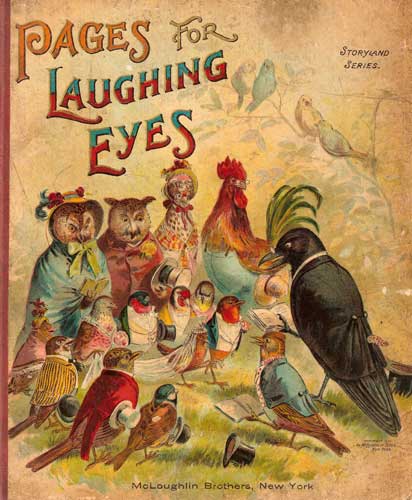
The Project Gutenberg EBook of Pages for Laughing Eyes, by Unknown This eBook is for the use of anyone anywhere at no cost and with almost no restrictions whatsoever. You may copy it, give it away or re-use it under the terms of the Project Gutenberg License included with this eBook or online at www.gutenberg.org Title: Pages for Laughing Eyes Author: Unknown Release Date: December 4, 2006 [EBook #20017] Language: English Character set encoding: ISO-8859-1 *** START OF THIS PROJECT GUTENBERG EBOOK PAGES FOR LAUGHING EYES *** Produced by Sigal Alon, Fox in the Stars, Janet Blenkinship and the Online Distributed Proofreading Team at http://www.pgdp.net






Over the lofty peaks of many of the mountains of Europe a magnificent bird may occasionally be seen flying, while down in the valley, two thousand feet or more below, a hen may be scratching worms for her dinner, or a young lamb gamboling over the sweet meadow grass.
From that enormous height, even, the keen eyes of the eagle can detect the movement of either, and she flies, or rather drops, straight down upon the poor fowl, and with her powerful foot kills it at a blow, or breaks the back of the pretty lamb with same terrible weapon. Then, she rises upward with her prey, to feed the little ones she has left in the nest.
Here you have a picture of busy street-life in a great city. Everybody is in a hurry and everybody wishes to get ahead. The man at the left has loaded his wagon so high that he finds it hard to hold the reins. Do you see the cunning little dog in the pony-cart? He means to see all there is about him.


At Christmas Jessie had a pretty French doll given to her by her aunt Amy. For weeks Jessie thought she had nothing more to wish for, but in the spring, however, when the days were warm and sunny, and nature called her out-of-doors, she found it rather inconvenient to take her dolly with her every time. She couldn't use her arms for anything else, you see, and like every other child, she liked to run and jump, and pick flowers and other things that caught her eye. But, like a good little mother, she thought her dolly needed the fresh air quite as much as herself; so one night, at the supper-table, she said: "I wish I had a carriage for Bella, then I could leave her in that when I went for buttercups and violets."
Papa was present, and he heard her remark. In a few days Jessie's birthday would come, and both he and her mamma had been thinking of what they would give her then; for Jessie was such a good, gentle child, seldom teasing for what she could not have, that they always took especial care to remember her on such holidays.
The innocent hint was just what he wanted. So on the birthday morn, Jessie found Bella seated in a beautiful little carriage, close beside her chair at the breakfast-table. You may be sure she was a very happy little girl then, and that she gave mamma and papa many loving hugs and kisses for their thoughtfulness and love.

I must tell you what happened to my little girl, for we all thought it so wonderful.
She was a dear child, only seven years old, and so anxious to have a friend all her own. One day I took her to Boston. She was wild with joy at being allowed to take such a long trip in the cars. As the train steamed out from Newport, Josie's happy little face was pressed close to the window; but after a while she grew less interested in the fields outside, and more so in the passengers near us.
"O mamma!" she whispered to me, "do you see that little girl opposite? I want her for a friend so much!"
The child she had noticed was indeed a sweet little girl, with hair almost as golden as Josie's own. She was soon smiling at Josie, and the two little travellers held up their dollies for each other to look at.

But before we got to Boston my little girl had grown weary, and soon was fast asleep. When we reached Boston she awoke, and saw her little friend disappearing. Josie waved her hand to her, and then, to my great surprise, shut her eyes tight.
"Why, darling," I said, "didn't you hear mamma tell you this was Boston? Don't go to sleep again; there are auntie and little Bess."
"Mamma," she answered gravely, "I was not going to sleep. I was asking God to let that little girl be my friend."
"But, my dear," I said, "you live in Newport, and you have only seen her in the cars. She probably lives in Boston. Come, auntie is hunting for us."
Josie had a fine time at auntie's, and her cousin Bess for a while filled completely the position of friend. But the week over, and we were aboard the train for Newport; and Josie's mind was again filled with the all-engrossing subject of—a friend.
We arrived at home in time for luncheon. Immediately after, Josie was in her room telling her sister all about her visit. Suddenly I heard a cry of joy. "O mamma! mamma! There she is! God did send her."
I hurried into Josie's room, and there at the window stood Josie, holding up her doll, and smiling at the window of the next house.
A second glance showed me that this was the very child we had seen in the cars.
The little girls soon became acquainted, for little Carrie had come to spend the winter with the Endicotts, who owned the house next our cottage.
No words can tell how happy my Josie has been with the little friend God sent her.



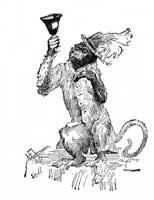
Oh, fun, fun, fun! Is there anything half so funny in this world as a monkey?
Just listen a moment, and I will tell you of one that I saw the other day.
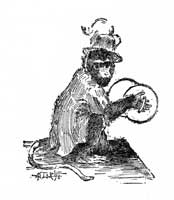
Think what a proud monkey he must have been, dressed in a fine suit of clothes! Then to have every one look out of the window when he rung the bell, while he sat up on the corner of the hand-organ. And how the children laughed to see him! After he had called every one within hearing to look at him, he made a little bow and took off his hat very politely.
Then he put down the bell, and his master gave him cymbals, which he banged together in a lively way.
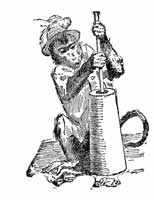
How delighted all were to see that Mr. Monkey was a student! It was so very queer to see the little scholar wearing those spectacles which the hand-organ man put on his nose; how well he held the tiny book, no matter if it was wrong side up!
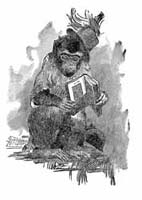
Mr. Monkey would have made a good farmer, we all said, when we saw him churn. The way that handle flew up and down would have made milk into butter very shortly, if there had been milk there.
Next came the fiddle, a nice little one, just the right size for a monkey to play. The hand-organ sounded very slowly while the little monkey played his fiddle. For fear that his master would feel badly because he was so far behind, Mr. Monkey put away his instrument, and bowed very low to the people, taking off his hat to thank them for the many pennies showered upon him.
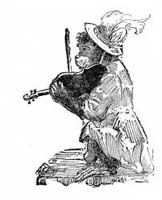

Bertie Gale lived near a noisy little brook, which went singing through the meadow. Just below the house in which he lived was a dam. It made a large pond above it, and the water was used to turn the wheel of a small woollen-mill.
It was such fun to watch the water pouring over the wheel, turning it swiftly round and round.
Bertie was never tired of looking at it, but it made his mother very anxious if her little boy was long out of her sight. But he had promised never to go into the water without permission.
But one summer the water was shut off for a while, and the mill was silent. The old wheel was badly decayed and broken, and Mr. Gale said a new wheel must be built.

Every day Bertie hurried home from school to watch his father and the workmen, as they built the new wheel.

One day when he came home, he ran down to the mill as usual. The wheel was in its place all ready for action.
How new and clean it looked! The workmen had gone, and no one was in sight.
"What a nice playhouse it would make," thought the boy. Then he stepped carefully into the wheel.
"This is my castle," said Bertie to himself, "and the brook is the river Rhine, and"—
Bertie did not finish his sentence. Suddenly there was a terrible roaring over his head, and the wheel began to go slowly around. The next thing the boy knew he was lying upon a pile of blocks and shavings, feeling very much as if he had been through his mother's sausage-mill, but very thankful that he was not still going around that swiftly-moving wheel. He was not very much hurt, but it was a long time before he cared to look at the water-wheel again.
One day lit-tle Jam-ie went with some friends to see some mov-ing pic-tures and a play called "The Johns-town Flood." He had been told the sto-ry be-fore and knew how it turned out. So he sat ver-y still through three acts, and then he saw a man who had been giv-en the name of "Paul Re-vere" just for that play, be-cause he was go-ing to do some-thing such as a real and great Paul Revere once did, more than a hun-dred years be-fore, a thing to warn the land of dan-ger and help the peo-ple to be free.

The man in the play had to mount a horse and gal-lop down a val-ley shout-ing to the peo-ple to go to the hills to get out of the way of a great flood which had bro-ken out from a res-er-voir a-bove the cit-y.
Just then, as the man mount-ed the horse, on the stage, little Jam-ie left his seat and ran home as fast as he could.
"Why, Jam-ie," said his moth-er "The show can't be o-ver yet, it's on-ly four o'clock."
"I know it is-n't o-ver yet, mam-ma," said Jam-ie, "but the ver-y next act was to be the flood, and I thought that if I staid I'd be drowned!"

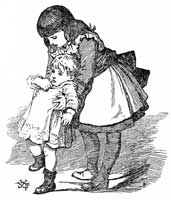
"El-sie, just mind the ba-by for a few min-utes while I fin-ish Jack's lit-tle trou-sers. He tears his clothes so that it's just patch, patch, put in pockets and sew on but-tons all the time."
"Oh, moth-er, look! Ba-by has tak-en a step! Come quick and look at him!"
So moth-er ran to see her ba-by-boy, and kiss the brave lit-tle fel-low who had dared to do this won-der-ful thing. She a-gain seat-ed her-self at her work, when she heard El-sie call, "Oh, mam-ma! Sa-die has got hold of grand-ma's bas-ket, and is toss-ing all the things out of it on the floor. She'll scream when I take it from her, but don't wor-ry, I think I can man-age her."
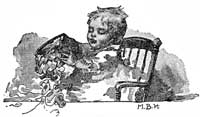
It was not long aft-er that when mam-ma cried out, "Why, there must be some-thing burn-ing! Oh, where is Tom-my? He has so many tricks with fire!"
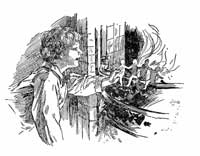
Up jumped mam-ma a-gain, and run-ing in-to the li-bra-ry, found Tom-my in high glee at play in front of a bright coal fire in the grate, on the top bar of which was a row of small fig-ures made from dough that cook was work-ing in the kitch-en. Tom had seized a big piece of dough, ran off with it to the li-bra-ry, and mould-ed it up to suit him in the shape of a row of small boys tak-ing hold of hands. He set them on the hot i-ron bar, and was brown-ing them ready to eat!
"This is great fun, moth-er!" said Tom. "I'll give the chil-dren some when they are baked!"

"It's a nice thing to have spring come!" said Vic-tor.
"With my red wheel-barrow I can work out in the gar-den ev-er-y day with O-bed. He says he'd rath-er have me with him than an-y two men! Why, I can car-ry a wa-ter-ing-pot, a lot of twigs, leaves and things I've raked off the flow-er beds, and some-times I e-ven car-ry a whole load of stones!
"O-bed is go-ing to teach me how to make one gar-den-bed for my-self. He says I can plant an-y-thing there that I like. I'm try-ing to think what I do like. O-bed says that some things come up when you plant seeds and some come up from bulbs. I like po-ta-toes and sweet peas. I guess I'll plant them. For a bor-der, I'd like small on-ions. Seems to me some tur-nips and hol-ly-hocks would look well in my bed. Now would-n't they? Sweet corn grows up pret-ty and grace-ful, I heard Aunt Hat-tie say, so I'll have some of that in my bed with a lot of for-get-me-nots. Aun-tie likes those ver-y much.
"Oh, I must have the fa-vor-ite flow-ers of each one in our house, come to think of it! Let's see, what is Papa's fa-vor-ite flow-er? I guess it must be squash, for he likes mam-ma's squash pies so much.
"Now what is mam-ma's? It must be he-li-o-trope. It's a hard word, but I've sure-ly heard her say he-li-o-trope sach-et. It must be a pret-ty flower, for ev-er-y thing in the clothes press has that per-fume, Ka-tie says.
"Now I don't know all these plants I've heard folks talk about. I don't know an-y of them. Per-haps be-fore I tell O-bed to get all these things for me to start I'd bet-ter ask him if they'll go well to-geth-er."

Grand-moth-er Gra-ham was a love-ly old la-dy. She had a beau-ti-ful home a few miles from the city. Her chil-dren and her grand-chil-dren went out to see her quite oft-en.

A-my thought there was no place like Grand-ma's for her sum-mer va-ca-tion. There was a lake, a boat, white lil-ies, squir-rels, grand trees old-er than grand-moth-er, her-self. Then there were barns, sta-bles, hor-ses, cows, calves, and a Shet-land pony that an-y child could ride.
A-my had her bi-cy-cle with her, and went off on it to see Grand-ma's neigh-bors and do any lit-tle er-rands that were re-quired. If cous-in Jam-ie were on a vis-it at the same time, per-haps he would mount Gyp-sy, the po-ny, and ride a-long by Am-y's side. A race be-tween the bi-cy-cle and the po-ny was great fun.
But there were days when rains kept the chil-dren in the house. Grand-ma told them love-ly sto-ries then. Jam-ie would sit play-ing with his sol-diers, and A-my al-ways had all she could do in her "house-days" as she called them, sew-ing to "keep her dolls in clothes," for "Elm Lodge" was a great place to wear out clothes.
The sto-ries Grand-ma liked best to tell were "true sto-ries" of the days when her own chil-dren were small, and A-my liked best to hear a-bout her own fa-ther and what he did when he was a child. So one day grand-ma told this:
"My lit-tle Har-vey was ver-y fond of fruit and flow-ers. When he was a wee bit of a lad he liked noth-ing bet-ter than to pull the tu-lips off by their heads and fill the crown of his hat with them. We told him that he must not do this, for there were not e-nough of them to waste in that way. He looked sad, but sat down un-der a tree, and seemed in deep thought. He was-n't more than three years old then.
"We left him and went in-to the house. In a few min-utes he went soft-ly down the gar-den walk, took off his shoes, stooped down, and scooped up earth e-nough to fill them, and then, in his stock-ing-feet, ran in a-mong the tulips and filled each cup full of the earth, emp-ty-ing all from his shoes in-to them. Daugh-ter and I had been watch-ing the child from the li-bra-ry win-dow. We crept out of the house and got in-to the gar-den as quick-ly as we could, and peep-ing be-hind the hon-ey suc-kle ar-bor, lis-tened while the lit-tle fel-low talked a-loud. 'Now 'ou tu-lips, dear, make haste and grow. All this dirt will make 'ou grow, I know, and then there'll be e-nough tu-lips for me to fill my 'it-tle hat full ev'ry day!'
"The lis-ten-ers had to laugh at that. My ba-by-boy dropped his shoes and ran as fast as he could a-way from us, 'round-and-'round, through the damp gar-den paths! He led us quite a chase be-fore we could catch him."
How A-my and Jam-ie laughed when Grand-ma told "tales out of school" as she called them.

"But I must just tell you this, my dear, for the tu-lip-story al-ways makes me think of it.
"There came a day, at last, when we had to send Har-vey to school. Tom-my Short took him, with his green wool-len bag, slate, pen-cil, and two cook-ies, just round the cor-ner to Miss Burt's school. Aft-er a few weeks, Grand-pa Chase met the new pu-pil in the gar-den one day, just as he came in from school.
"'Well, Har-vey' said Grandpa, 'I suppose you can spell al-most an-y thing by this time!'
"'Yes, sir?' said Har-vey.
"'Can you spell rat?'
"'R-a-t, rat' said the small boy, with much pride.
"'Ver-y well, my boy. Now can you spell mouse?'
"Har-vey wrink-led up his fore-head and tried hard to think how it could be done. Aft-er a few min-utes the child said, 'No, Grandpa, I can't do it.'
"'What,' cried Grandpa Chase, 'you can spell a great rat and can't spell a lit-tle bit of a mouse!'
"A-gain Har-vey thought hard, and then he said, 'Yes I can spell a big rat, but I guess a spelt mouse is a great deal big-ger than a spelt rat!'"

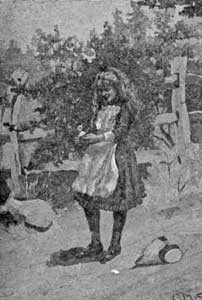
The Berk-ville Ham-let School pu-pils took much in-ter-est in the Fresh Air Chil-dren who had been sent out to their vil-lage for sum-mer out-ings. They had thought of ways in which mon-ey could be raised to help a-long the good cause.
"Why could-n't we have some tab-leaux and oth-er things in our school house on Sa-tur-day af-ter-noons in May?" asked Jen-nie Hill. "Tom-my Burns would print the tickets and all the chil-dren in the vil-lage will, I know, sell them."
So the mat-ter was talked ov-er, and all the peo-ple liked the plan so much that the young folks soon be-gan to prac-tice their parts for the first day.
Le-on and Ef-fie King were to wear old time cos-tumes, stand ver-y still, and not speak. They made a pleas-ing tab-leau. There was a plat-form in the school room, on the back of which were placed ev-er-green trees. For some scenes a pho-tog-ra-pher's screens were used for a back-ground.

An-na Mor-ris ap-peared af-ter Le-on and Ef-fie. She made a pret-ty pic-ture.
Al-lan Frost, in a clear, pleas-ant voice gave the name of each scene. He was a boy in the Pri-ma-ry class. All liked to hear young Al-lan speak. When he called "The Task," the cur-tain, which had been hung a-cross the plat-form end of the room, was pulled aside, and there sat Ann Green, the lar-gest girl in school look-ing as if she were hard at work at the task of puzz-ling out some prob-lem.
Bes-sie Burns said she would play she was a laun-dress. She did her part well.
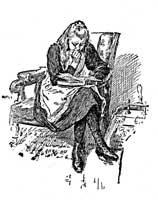
The school chil-dren thought up what they would like to be. Hen-ry Hard-ing a dark-eyed, black hair-ed boy said he thought he could get him-self up to look like a pic-ture he seen of an East-ern Grass Sell-er. So he was announced un-der that ti-tle. All thought he looked his part.
It would make too long a sto-ry to tell ev-er-y thing a-bout that show. But the last scene was rath-er an odd one. One far-mer who lived out a short dis-tance from the vil-lage, had an old-fash-ioned ma-chine which had been in his cel-lar for a great man-y years. One of the school boys knew of this queer ar-ti-cle and coaxed the loan of it for the show.
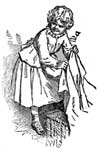
Jer-ry Jar-vis, fath-er of one of the pu-pils, said that he had turned the crank of that ma-chine time and time a-gain when he was a boy, and that he was will-ing to go on the stage with it at that time if it would help a-long the "Show," and raise mon-ey for the "Cause." So when the clos-ing scene came Al-lan Frost called "The Grind-er!"
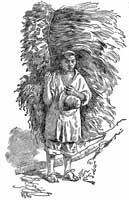
The folks all en-joyed those Sa-tur-day af-ter-noons. The chil-dren tried to va-ry the shows as much as they could. One day they gave a con-cert. Once they sold home-made can-dy and cakes. Their "Col-o-ni-al Loan" par-ty was much praised. The vil-lage had man-y treas-ures in old chi-na, fur-ni-ture, can-dle sticks, kit-chen ar-ti-cles, pic-tures, guns, swords, and clothes of old times.
All were sur-prised at the ti-dy sum col-lect-ed and man-y a poor ci-ty child re-joiced in the out-ing that mon-ey brought to them through the Fresh Air So-ci-ety.

"Run out to the barn, An-nie and see if you can find some eggs. I mean to make cake this morn-ing and I shall want four or five," said Mrs. Brown to her lit-tle daugh-ter, An-nie, who had been help-ing her moth-er in the kit-chen work.
Hunt-ing for hen's eggs was great fun for the chil-dren at Brown Farm. Some-times two of them would go out to-geth-er, and each would try to get more eggs than the oth-er, and be the first to reach the kit-chen with a cap or hat full.

An-nie placed a short light lad-der a-gainst a high beam in the barn, climbed up and just as she reached the top, her bright eyes peep-ing in through the hay piled up on the barn-loft floor, she saw a nice hol-low place, some-thing like a small cave, where one wise bid-dy had scratched out a co-sy nest for her-self, and laid some five large eggs. The hen had gone out for a walk or for a lunch-eon, so An-nie took four of the eggs, put them in-to the crown of her hat, and hast-ened back to give them to her moth-er.
"May I not beat them up for you, with the whirl-i-gig beat-er, moth-er, it is so much fun?"
"Yes, you may, An-nie, and it will be quite a help to me."
So on through the morn-ing the lit-tle girl found man-y a use-ful and plea-sant thing to do. When the work was all done and an out-ing had been planned for the af-ter-noon, Mrs. Brown said to An-nie, "This lit-tle verse comes to my mind. I think one of my old-er chil-dren once learned it at school. It is,

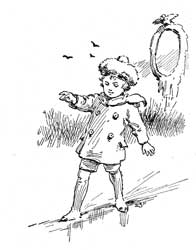
h, I'll go and see if the ice is firm," said Robin to his friend Marjie, one winter's morning.
He went off carrying his skates, and when he reached the ice he laid them on the bank, and then thought he would have a slide.
Marjie, who had followed Robin to the pond, caught up the skates and went behind a tree and put them on, and was soon skating across the pond. After a while she went to Robin, who was standing by the bank, looking full of dismay.
"Why, Marjie!" he cried, "I never saw you come! I've lost my skates! I left them on the bank and they are gone!"
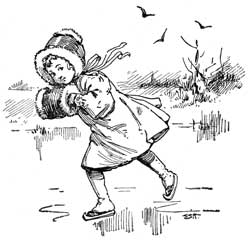
"Some wicked person must have taken them!" said Marjie.
"I would like to catch him," said Robin.
"Then catch me, Robin!" said Marjie.
Robin gazed at her. Then a light broke over his face.
"Oh, I see!" he cried: "you put them on while I was sliding! Well, now we can take turns with the skates!"
Marjie thought, as she gave Robin a hug, that there was never a dearer friend than he!



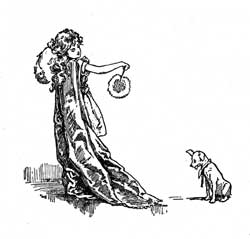
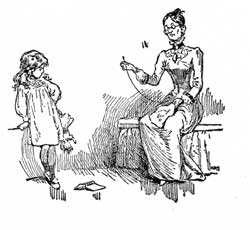

"Here's a pie I found cooling on the bench under the pantry window!" said Tom Sommers. "I'm going to eat it all myself!"
"That is the cook's pie. I saw her making it," said wee George.

"Won't 'ou div me some pie?" asked little Ella.
"No, I won't give you one single bit. This pie is full of plums and juice, I know. Ah! but it will have a good taste! No, Nancy, Susanna, Mariah Anniah you shall not have even a taste of this sweet pie!"
"My name is'nt 'Ria Sannia' 'Ou're a bad boy. 'Ou call me names. 'Ou won't div me any pie! 'Ou eat it all alone!"
"Well, now, this is too bad. Not a knife in any of my pockets! Happen to have a jack-knife with you, Georgie?"
"No, I haven't any knife."
"What, a big boy like you and no jack-knife?"
"I'd like one, but folks say I'm too little to have one yet. But I'm going to save all my candy money now and buy one for myself."
"Very well, no knife, no pie! It's getting late and I must be going along. It'll take me some time to get there for I must walk slowly so as not to spill a drop of this juicy pie. Good bye."
Saying this, Tom walked away with the pie.
Just then a loud and angry voice was heard shouting, "Where's that pie?" The stout cook came rushing upon the scene, shaking her dish cloth and rolling pin in the air. "Who's got that pie?" she screamed as she ran around and around and back again to the same bench where she had placed the pie to cool. What was her surprise, then, to see the very same pie just where she had left it!
"Oh it's that bad boy, Tom Sommers, who has been playing this trick on me!" she shouted, in a loud voice. "Just let me catch him!"
One day when brother John came home from market he brought a baby lamb for Maude.
"I thought you'd like this little playmate, sister, you seem to be alone so much. This baby doesn't know how to nibble grass yet and you'll have to get mamma to show you how to bring him up."

Maude was delighted with her present. Her mother took a baby's nurse-bottle and filled it with sweet new milk and in a very short time Lambkin could take, through the rubber tube, all the milk his kind friends would give him.
Maude and her pet made a pretty picture playing together in the meadow.
Nora, who worked in the kitchen, used to sing an odd little song, some of the words being,

"Now try to learn this, Trotty. Of course, you're little and don't know much, but when folks ask you how old your brother is you can just say 'a whole hand old!'"
"What for buver?"
"Well, it's because I'm just five years old! You won't have to learn to count yet, but you take a short path and say 'a whole hand old!' Now will you do it?"
"I will try!"

"Company coming to-morrow and not a crumb of cake in the house!" said Mrs. Brown one morning. "Jane's gone and there's all the sweeping to do, the baby to take care of, and three meals a day to get!"
"Mother, mother dear," called Ruth from the next room, "do let me make the cake. I should like nothing better. It would be great fun."
"Great fun! Now that is what one says who knows nothing about it. It would be better to go without any cake at all than to place before our friends some that they cannot eat," replied the tired mother.
"When I was at Aunt Fanny's," said Ruth, "she taught me how to make a kind of cake that we all liked. Uncle John said he could eat all I could make. Do let me try, mother dear."
"Oh, Ruth, what a tease you are. Well, it will keep you quiet for a while and I suppose you must learn somehow."
Then Ruth ran into the kitchen in high glee. First she looked at the fire in the stove as Aunt Fanny had taught her to do. More coal was needed. So she had to go down cellar and bring up as much as she could in the hod. She opened the draughts and put on a little coal at first. When that had kindled she put on a little more. She took a whisk and swept out the stove oven. Then she put more water into the kettle on on top of the stove. Soon it was time to close the draughts. She put her hand into the oven to feel how hot it was just as she had seen her Aunt Fanny do.

When the stove was as she wanted it, Ruth ran out to the barn and found four warm eggs in nests among the hay. These she brought into the house, and breaking them into a bowl, began to beat them up quickly. Next she took a yellow dish from the dresser and put into it one cup of butter and two cups of sugar. For a long time she mixed these two together until they were "all one," as she called it.
Next she put the four beaten eggs into the bowl with the butter and sugar, and beat them until her little hands ached. Then she measured out three cups of flour and sifted it into another dish. With this she put two teaspoonfuls of baking powder, and then sifted flour and baking powder together. After this was done, she added a little of it at a time to the mixture of butter and eggs, beating away until all the flour had been used up. Then she put into it a teaspoonful of vanilla essence and added enough milk to make a thick batter. Little pans shaped like hearts and rounds, and one large round pan were then well greased, and the beaten up cake put into each pan until it was half full. Then the pans of cake were set into the oven and in ten or fifteen minutes all the tiny "hearts and rounds" were baked a light brown, while the large pan had to stay baking ten or fifteen minutes more.
A very happy child was young Ruth when she took out her pans of cake.
Her father, mother, brothers and the "company" who arrived the next day thought it the "nicest cake ever made by so young a little girl."

End of the Project Gutenberg EBook of Pages for Laughing Eyes, by Unknown
*** END OF THIS PROJECT GUTENBERG EBOOK PAGES FOR LAUGHING EYES ***
***** This file should be named 20017-h.htm or 20017-h.zip *****
This and all associated files of various formats will be found in:
http://www.gutenberg.org/2/0/0/1/20017/
Produced by Sigal Alon, Fox in the Stars, Janet Blenkinship
and the Online Distributed Proofreading Team at
http://www.pgdp.net
Updated editions will replace the previous one--the old editions
will be renamed.
Creating the works from public domain print editions means that no
one owns a United States copyright in these works, so the Foundation
(and you!) can copy and distribute it in the United States without
permission and without paying copyright royalties. Special rules,
set forth in the General Terms of Use part of this license, apply to
copying and distributing Project Gutenberg-tm electronic works to
protect the PROJECT GUTENBERG-tm concept and trademark. Project
Gutenberg is a registered trademark, and may not be used if you
charge for the eBooks, unless you receive specific permission. If you
do not charge anything for copies of this eBook, complying with the
rules is very easy. You may use this eBook for nearly any purpose
such as creation of derivative works, reports, performances and
research. They may be modified and printed and given away--you may do
practically ANYTHING with public domain eBooks. Redistribution is
subject to the trademark license, especially commercial
redistribution.
*** START: FULL LICENSE ***
THE FULL PROJECT GUTENBERG LICENSE
PLEASE READ THIS BEFORE YOU DISTRIBUTE OR USE THIS WORK
To protect the Project Gutenberg-tm mission of promoting the free
distribution of electronic works, by using or distributing this work
(or any other work associated in any way with the phrase "Project
Gutenberg"), you agree to comply with all the terms of the Full Project
Gutenberg-tm License (available with this file or online at
http://gutenberg.org/license).
Section 1. General Terms of Use and Redistributing Project Gutenberg-tm
electronic works
1.A. By reading or using any part of this Project Gutenberg-tm
electronic work, you indicate that you have read, understand, agree to
and accept all the terms of this license and intellectual property
(trademark/copyright) agreement. If you do not agree to abide by all
the terms of this agreement, you must cease using and return or destroy
all copies of Project Gutenberg-tm electronic works in your possession.
If you paid a fee for obtaining a copy of or access to a Project
Gutenberg-tm electronic work and you do not agree to be bound by the
terms of this agreement, you may obtain a refund from the person or
entity to whom you paid the fee as set forth in paragraph 1.E.8.
1.B. "Project Gutenberg" is a registered trademark. It may only be
used on or associated in any way with an electronic work by people who
agree to be bound by the terms of this agreement. There are a few
things that you can do with most Project Gutenberg-tm electronic works
even without complying with the full terms of this agreement. See
paragraph 1.C below. There are a lot of things you can do with Project
Gutenberg-tm electronic works if you follow the terms of this agreement
and help preserve free future access to Project Gutenberg-tm electronic
works. See paragraph 1.E below.
1.C. The Project Gutenberg Literary Archive Foundation ("the Foundation"
or PGLAF), owns a compilation copyright in the collection of Project
Gutenberg-tm electronic works. Nearly all the individual works in the
collection are in the public domain in the United States. If an
individual work is in the public domain in the United States and you are
located in the United States, we do not claim a right to prevent you from
copying, distributing, performing, displaying or creating derivative
works based on the work as long as all references to Project Gutenberg
are removed. Of course, we hope that you will support the Project
Gutenberg-tm mission of promoting free access to electronic works by
freely sharing Project Gutenberg-tm works in compliance with the terms of
this agreement for keeping the Project Gutenberg-tm name associated with
the work. You can easily comply with the terms of this agreement by
keeping this work in the same format with its attached full Project
Gutenberg-tm License when you share it without charge with others.
1.D. The copyright laws of the place where you are located also govern
what you can do with this work. Copyright laws in most countries are in
a constant state of change. If you are outside the United States, check
the laws of your country in addition to the terms of this agreement
before downloading, copying, displaying, performing, distributing or
creating derivative works based on this work or any other Project
Gutenberg-tm work. The Foundation makes no representations concerning
the copyright status of any work in any country outside the United
States.
1.E. Unless you have removed all references to Project Gutenberg:
1.E.1. The following sentence, with active links to, or other immediate
access to, the full Project Gutenberg-tm License must appear prominently
whenever any copy of a Project Gutenberg-tm work (any work on which the
phrase "Project Gutenberg" appears, or with which the phrase "Project
Gutenberg" is associated) is accessed, displayed, performed, viewed,
copied or distributed:
This eBook is for the use of anyone anywhere at no cost and with
almost no restrictions whatsoever. You may copy it, give it away or
re-use it under the terms of the Project Gutenberg License included
with this eBook or online at www.gutenberg.org
1.E.2. If an individual Project Gutenberg-tm electronic work is derived
from the public domain (does not contain a notice indicating that it is
posted with permission of the copyright holder), the work can be copied
and distributed to anyone in the United States without paying any fees
or charges. If you are redistributing or providing access to a work
with the phrase "Project Gutenberg" associated with or appearing on the
work, you must comply either with the requirements of paragraphs 1.E.1
through 1.E.7 or obtain permission for the use of the work and the
Project Gutenberg-tm trademark as set forth in paragraphs 1.E.8 or
1.E.9.
1.E.3. If an individual Project Gutenberg-tm electronic work is posted
with the permission of the copyright holder, your use and distribution
must comply with both paragraphs 1.E.1 through 1.E.7 and any additional
terms imposed by the copyright holder. Additional terms will be linked
to the Project Gutenberg-tm License for all works posted with the
permission of the copyright holder found at the beginning of this work.
1.E.4. Do not unlink or detach or remove the full Project Gutenberg-tm
License terms from this work, or any files containing a part of this
work or any other work associated with Project Gutenberg-tm.
1.E.5. Do not copy, display, perform, distribute or redistribute this
electronic work, or any part of this electronic work, without
prominently displaying the sentence set forth in paragraph 1.E.1 with
active links or immediate access to the full terms of the Project
Gutenberg-tm License.
1.E.6. You may convert to and distribute this work in any binary,
compressed, marked up, nonproprietary or proprietary form, including any
word processing or hypertext form. However, if you provide access to or
distribute copies of a Project Gutenberg-tm work in a format other than
"Plain Vanilla ASCII" or other format used in the official version
posted on the official Project Gutenberg-tm web site (www.gutenberg.org),
you must, at no additional cost, fee or expense to the user, provide a
copy, a means of exporting a copy, or a means of obtaining a copy upon
request, of the work in its original "Plain Vanilla ASCII" or other
form. Any alternate format must include the full Project Gutenberg-tm
License as specified in paragraph 1.E.1.
1.E.7. Do not charge a fee for access to, viewing, displaying,
performing, copying or distributing any Project Gutenberg-tm works
unless you comply with paragraph 1.E.8 or 1.E.9.
1.E.8. You may charge a reasonable fee for copies of or providing
access to or distributing Project Gutenberg-tm electronic works provided
that
- You pay a royalty fee of 20% of the gross profits you derive from
the use of Project Gutenberg-tm works calculated using the method
you already use to calculate your applicable taxes. The fee is
owed to the owner of the Project Gutenberg-tm trademark, but he
has agreed to donate royalties under this paragraph to the
Project Gutenberg Literary Archive Foundation. Royalty payments
must be paid within 60 days following each date on which you
prepare (or are legally required to prepare) your periodic tax
returns. Royalty payments should be clearly marked as such and
sent to the Project Gutenberg Literary Archive Foundation at the
address specified in Section 4, "Information about donations to
the Project Gutenberg Literary Archive Foundation."
- You provide a full refund of any money paid by a user who notifies
you in writing (or by e-mail) within 30 days of receipt that s/he
does not agree to the terms of the full Project Gutenberg-tm
License. You must require such a user to return or
destroy all copies of the works possessed in a physical medium
and discontinue all use of and all access to other copies of
Project Gutenberg-tm works.
- You provide, in accordance with paragraph 1.F.3, a full refund of any
money paid for a work or a replacement copy, if a defect in the
electronic work is discovered and reported to you within 90 days
of receipt of the work.
- You comply with all other terms of this agreement for free
distribution of Project Gutenberg-tm works.
1.E.9. If you wish to charge a fee or distribute a Project Gutenberg-tm
electronic work or group of works on different terms than are set
forth in this agreement, you must obtain permission in writing from
both the Project Gutenberg Literary Archive Foundation and Michael
Hart, the owner of the Project Gutenberg-tm trademark. Contact the
Foundation as set forth in Section 3 below.
1.F.
1.F.1. Project Gutenberg volunteers and employees expend considerable
effort to identify, do copyright research on, transcribe and proofread
public domain works in creating the Project Gutenberg-tm
collection. Despite these efforts, Project Gutenberg-tm electronic
works, and the medium on which they may be stored, may contain
"Defects," such as, but not limited to, incomplete, inaccurate or
corrupt data, transcription errors, a copyright or other intellectual
property infringement, a defective or damaged disk or other medium, a
computer virus, or computer codes that damage or cannot be read by
your equipment.
1.F.2. LIMITED WARRANTY, DISCLAIMER OF DAMAGES - Except for the "Right
of Replacement or Refund" described in paragraph 1.F.3, the Project
Gutenberg Literary Archive Foundation, the owner of the Project
Gutenberg-tm trademark, and any other party distributing a Project
Gutenberg-tm electronic work under this agreement, disclaim all
liability to you for damages, costs and expenses, including legal
fees. YOU AGREE THAT YOU HAVE NO REMEDIES FOR NEGLIGENCE, STRICT
LIABILITY, BREACH OF WARRANTY OR BREACH OF CONTRACT EXCEPT THOSE
PROVIDED IN PARAGRAPH F3. YOU AGREE THAT THE FOUNDATION, THE
TRADEMARK OWNER, AND ANY DISTRIBUTOR UNDER THIS AGREEMENT WILL NOT BE
LIABLE TO YOU FOR ACTUAL, DIRECT, INDIRECT, CONSEQUENTIAL, PUNITIVE OR
INCIDENTAL DAMAGES EVEN IF YOU GIVE NOTICE OF THE POSSIBILITY OF SUCH
DAMAGE.
1.F.3. LIMITED RIGHT OF REPLACEMENT OR REFUND - If you discover a
defect in this electronic work within 90 days of receiving it, you can
receive a refund of the money (if any) you paid for it by sending a
written explanation to the person you received the work from. If you
received the work on a physical medium, you must return the medium with
your written explanation. The person or entity that provided you with
the defective work may elect to provide a replacement copy in lieu of a
refund. If you received the work electronically, the person or entity
providing it to you may choose to give you a second opportunity to
receive the work electronically in lieu of a refund. If the second copy
is also defective, you may demand a refund in writing without further
opportunities to fix the problem.
1.F.4. Except for the limited right of replacement or refund set forth
in paragraph 1.F.3, this work is provided to you 'AS-IS', WITH NO OTHER
WARRANTIES OF ANY KIND, EXPRESS OR IMPLIED, INCLUDING BUT NOT LIMITED TO
WARRANTIES OF MERCHANTIBILITY OR FITNESS FOR ANY PURPOSE.
1.F.5. Some states do not allow disclaimers of certain implied
warranties or the exclusion or limitation of certain types of damages.
If any disclaimer or limitation set forth in this agreement violates the
law of the state applicable to this agreement, the agreement shall be
interpreted to make the maximum disclaimer or limitation permitted by
the applicable state law. The invalidity or unenforceability of any
provision of this agreement shall not void the remaining provisions.
1.F.6. INDEMNITY - You agree to indemnify and hold the Foundation, the
trademark owner, any agent or employee of the Foundation, anyone
providing copies of Project Gutenberg-tm electronic works in accordance
with this agreement, and any volunteers associated with the production,
promotion and distribution of Project Gutenberg-tm electronic works,
harmless from all liability, costs and expenses, including legal fees,
that arise directly or indirectly from any of the following which you do
or cause to occur: (a) distribution of this or any Project Gutenberg-tm
work, (b) alteration, modification, or additions or deletions to any
Project Gutenberg-tm work, and (c) any Defect you cause.
Section 2. Information about the Mission of Project Gutenberg-tm
Project Gutenberg-tm is synonymous with the free distribution of
electronic works in formats readable by the widest variety of computers
including obsolete, old, middle-aged and new computers. It exists
because of the efforts of hundreds of volunteers and donations from
people in all walks of life.
Volunteers and financial support to provide volunteers with the
assistance they need, is critical to reaching Project Gutenberg-tm's
goals and ensuring that the Project Gutenberg-tm collection will
remain freely available for generations to come. In 2001, the Project
Gutenberg Literary Archive Foundation was created to provide a secure
and permanent future for Project Gutenberg-tm and future generations.
To learn more about the Project Gutenberg Literary Archive Foundation
and how your efforts and donations can help, see Sections 3 and 4
and the Foundation web page at http://www.pglaf.org.
Section 3. Information about the Project Gutenberg Literary Archive
Foundation
The Project Gutenberg Literary Archive Foundation is a non profit
501(c)(3) educational corporation organized under the laws of the
state of Mississippi and granted tax exempt status by the Internal
Revenue Service. The Foundation's EIN or federal tax identification
number is 64-6221541. Its 501(c)(3) letter is posted at
http://pglaf.org/fundraising. Contributions to the Project Gutenberg
Literary Archive Foundation are tax deductible to the full extent
permitted by U.S. federal laws and your state's laws.
The Foundation's principal office is located at 4557 Melan Dr. S.
Fairbanks, AK, 99712., but its volunteers and employees are scattered
throughout numerous locations. Its business office is located at
809 North 1500 West, Salt Lake City, UT 84116, (801) 596-1887, email
business@pglaf.org. Email contact links and up to date contact
information can be found at the Foundation's web site and official
page at http://pglaf.org
For additional contact information:
Dr. Gregory B. Newby
Chief Executive and Director
gbnewby@pglaf.org
Section 4. Information about Donations to the Project Gutenberg
Literary Archive Foundation
Project Gutenberg-tm depends upon and cannot survive without wide
spread public support and donations to carry out its mission of
increasing the number of public domain and licensed works that can be
freely distributed in machine readable form accessible by the widest
array of equipment including outdated equipment. Many small donations
($1 to $5,000) are particularly important to maintaining tax exempt
status with the IRS.
The Foundation is committed to complying with the laws regulating
charities and charitable donations in all 50 states of the United
States. Compliance requirements are not uniform and it takes a
considerable effort, much paperwork and many fees to meet and keep up
with these requirements. We do not solicit donations in locations
where we have not received written confirmation of compliance. To
SEND DONATIONS or determine the status of compliance for any
particular state visit http://pglaf.org
While we cannot and do not solicit contributions from states where we
have not met the solicitation requirements, we know of no prohibition
against accepting unsolicited donations from donors in such states who
approach us with offers to donate.
International donations are gratefully accepted, but we cannot make
any statements concerning tax treatment of donations received from
outside the United States. U.S. laws alone swamp our small staff.
Please check the Project Gutenberg Web pages for current donation
methods and addresses. Donations are accepted in a number of other
ways including checks, online payments and credit card
donations. To donate, please visit: http://pglaf.org/donate
Section 5. General Information About Project Gutenberg-tm electronic
works.
Professor Michael S. Hart is the originator of the Project Gutenberg-tm
concept of a library of electronic works that could be freely shared
with anyone. For thirty years, he produced and distributed Project
Gutenberg-tm eBooks with only a loose network of volunteer support.
Project Gutenberg-tm eBooks are often created from several printed
editions, all of which are confirmed as Public Domain in the U.S.
unless a copyright notice is included. Thus, we do not necessarily
keep eBooks in compliance with any particular paper edition.
Most people start at our Web site which has the main PG search facility:
http://www.gutenberg.org
This Web site includes information about Project Gutenberg-tm,
including how to make donations to the Project Gutenberg Literary
Archive Foundation, how to help produce our new eBooks, and how to
subscribe to our email newsletter to hear about new eBooks.
*** END: FULL LICENSE ***